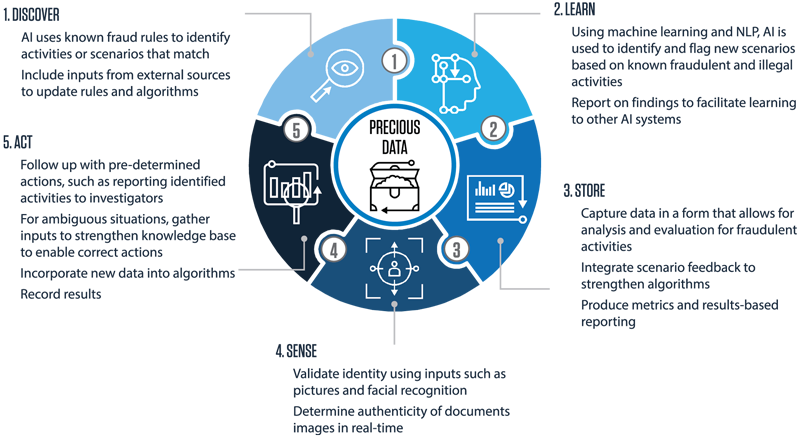-
-
Like what you see?
LetsTalkUrl
Let's Talk
As motor vehicle agencies become more digital (e.g., mobile driver’s license, autonomous vehicles, electronic titles and liens, connected devices etc.), they add new channels (APIs, mobile devices, Wi-Fi, or cellular networks) for delivering services and accessing customer data. While this connectivity improves efficiencies and customer experience, it also increases data exposure, making motor vehicle agencies vulnerable to fraudulent activities.
There are high costs associated with fraud detection and investigation. Despite best efforts, many criminal activities are not prevented or even identified. Gathering sufficient evidence for prosecution is difficult and the public’s confidence in the security of their data gets undermined.
Artificial intelligence (AI) technologies, faster 5G networks, and Internet of Things (IoT) data can provide motor vehicle agencies with greater information to facilitate machine learning models for detection of suspicious activities, patterns and queries by users and customers alike.
Infosys Artificial Intelligence (AI) Solution combines these technologies to help motor vehicle agencies detect and prevent fraudulent and illegal activities. The solution enables agencies to ingest transaction data in real-time and analyze it through augmented models of behavior based on self-teaching algorithms. The AI systems can stop or flag transactions for investigative purposes and incorporate adaptive self-learning from historical and ongoing transactions, data patterns and investigators’ feedback to update its models continuously and automatically in near real-time. This allows motor vehicle agencies to proactively monitor and identify potentially fraudulent activities based on known fraud patterns and detect frauds in transactions.
Fraudulent behavior differs from one industry and jurisdiction to another. Infosys AI Solution offers a flexible and automated learning (trends and anomalies) environment for each agency to detect and prevent transactional fraud. For example:
Infosys AI Solution deploys machine learning tools to detect fraud cases from agency datasets like driver profiles with details of past convictions and traffic violations. For extended well-known patterns, Infosys AI Solution can integrate with third party services for “known unknown” scenarios like ecommerce transactions, naming conventions, reused entries, geographically diverse entries etc.
To maintain or improve effectiveness, agencies should employ continuous monitoring activities to improve the detection accuracy and feed any data with new fraud patterns into the AI training pipeline. When necessary, additional automated training tasks should be executed to ensure detection models provide a good level of accuracy.
Infosys AI Solution leverages unsupervised Artificial Intelligence (AI)/ Machine Learning (ML) algorithms like clustering, outlier detection and anomaly detection to identify known-unknown fraud patterns. For example, multiple vehicle registrations or license registrations using the same address details, falsified documents for driver license, high volume transaction patterns. This continuous monitoring can provide the data needed to gauge the scope and effect of risk of suspected fraudulent actively, enabling the creation of appropriate mitigation plans.
Also Read: AI & DMVs: An Approach to Improve Customer Interactions and Minimize Fraud/Illegal Activity
Once a fraud event or pattern is detected, specific triggers/integrations can be setup which can then feed the relevant fraud related information into a case management solution.
The automated or ad hoc creation of cases upon the detection of suspicious activities/patterns can be achieved through the existing motor vehicle agency’s vehicle registration, licensing, and financial systems.
Alerts can be generated to send out relevant notifications to the internal staff, auditors, program administrators, and external customers.
The Infosys AI Solution allows stakeholders to submit requests (e.g., for information, investigation etc.) to fraud management solution through a digital intake portal that integrates with the existing registration, licensing, and financial systems. It can also be tailored to offer an external facing self-service option so users can submit the necessary requests to the motor vehicle agencies for follow-up and further processing. The solution protects these communications through advanced encryption algorithms and secured login.
Enabling automation-led decision-making by using neural networks that span boundaries will lead to the creation of best practices and lessons learned without additional work by the agency staff. Some of the key benefits of using AI to combat fraud and illegal activities include:

Criminal and fraudulent activities take advantage of breaches in agency security protocols and procedures. Infosys AI Solution enables motor vehicle agencies to predict potential fraudulent transactions as soon as relevant activities are detected, enabling agencies to deliver a more secure service experience to constituents. With Infosys AI solution, motor vehicle agencies can address several vulnerabilities including:

Kannan is an Associate Partner and Heads the DMV practice for Infosys Public Services. He is an experienced Digital Transformation Executive with a track record of connecting Strategy, Business and Technology to drive enterprise value. Kannan is skilled in Product and Services Marketing, Design Thinking, Consultative Selling with focus on Customer Experience Applications, Data Science, and Cloud Computing technologies.

Nick is a principal consultant with Infosys Public Services’ Transportation sector and has over 35 years of experience in the DMV domain. Prior to joining Infosys Public Services, Nick served as the Director of Information Technology at the Connecticut DMV and Director of IT Operations at the Connecticut Bureau Enterprise Systems and Technologies. He has led numerous business process improvement projects, designing and developing innovative business solutions that help motor vehicle agencies become more customer-centric and agile.